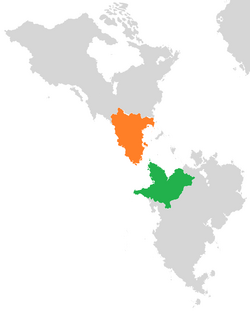Mutul-Belfras relations
This article is incomplete because it is pending further input from participants, or it is a work-in-progress by one author. Please comment on this article's talk page to share your input, comments and questions. Note: To contribute to this article, you may need to seek help from the author(s) of this page. |
 | |
Mutul |
Belfras |
|---|---|
| Diplomatic mission | |
| Embassy of His Divine Lordship, Thessalona | Embassy of Belfras, K'alak Muul |
| Envoy | |
| Ambassador Hun Tz'ibahk | Ambassador |
The Divine Kingdom and Belfras entertain long and complex ties dating back to the Belfrasian Crusade during the 13th century. To this day, they maintain diplomatic and trade relations, even if they are impeded by mutual sanctions in place since the 50s. Politicaly, the two nations have often been bitter ennemies since the creation of the Belfrasian Federation in the later part of the 19th century, which led to two major wars, in 1911 and 1928. Since then, even if both countries never officialy stopped diplomatic contacts with one another, they remain opposed on numerous questions. One of these conflictuous matter is the geopolitical balance in the Kayamuca Sea.
Since 2019, the relations between the two countries have once again deteriorated greatly over conflictuous responses in the Ayelian Crisis.
History
Belfrasian Crusade
War of 1911
War of 1928
1955 Sanctions
In 1955 the Orientalist politician and administrator Yu Kun Maax was arrested on charges of sedition and treason. He was notably accused of having secretly converted to Fabrianism to marry his wife, to have favored the diffusion of monotheistic ideas among the population, and generally to have worked alongside Belfras, Latium, and other Belisarians powers against the Mutul’s social order and the K’uhul Ajaw. This was the first step of a large purge against the Orientalists that had dominated the Mutul political scene since the end of the 1928 War and was spear-headed by both the Occidentalists and Traditionalists, with the participation and help of the Divine Throne.
The Orientalists were not on friendly relationship with Thessalona but favored the idea of a Latium - Mutul reconciliation to potentially make sure Belfras' main ally would lose interest in "The Pond". The fall of the Orientalists and replacement by more radicals groups was thus not seen negatively by the Belfrasian authorities. Instead, now that the main Mutulese political movement agreeable to Belisaria was dissolved, Thessalona used the opportunity to lobby in Castellum and other Belisarian capitals for the application of economic sanctions against the Divine Throne. Their efforts were helped by Yisrael own Boycott campaign against the Mutul in the wake of Darkness in the Heart of Oxidentale's publication.
The Sanctions promoted by the Belfrasians federation ended up having important consequence on the diplomatic ties between the two countries, as well as their respective economies. The Mutul entered a period of economic crisis, as it was abruptly cut from Belisarian markets and capitals, but also of political upheaveal because of the combined consequences of both the crisis and the Land reforms promoted by the Occidentalists and Traditionalists politicians now in power.